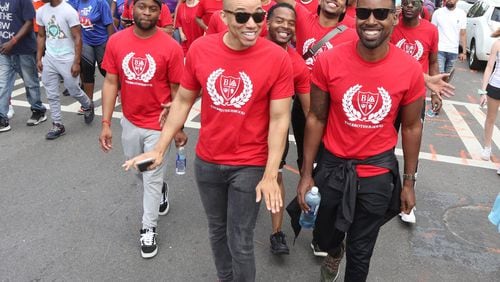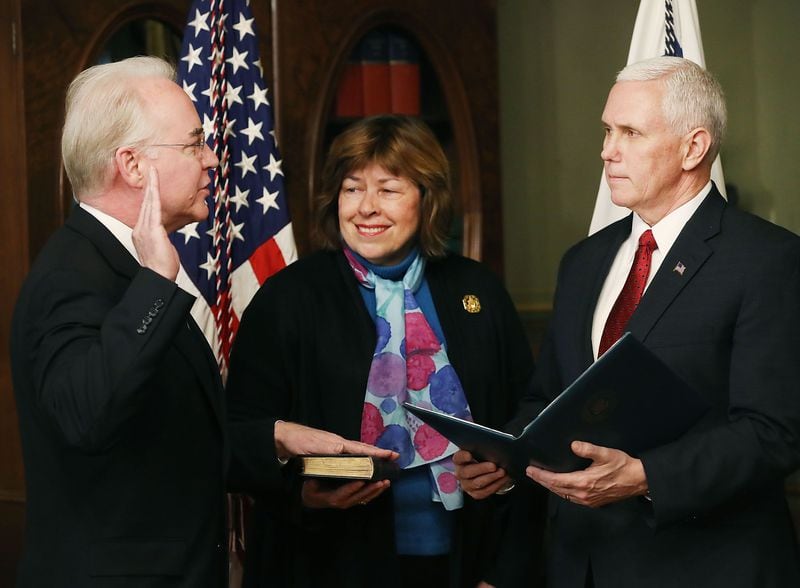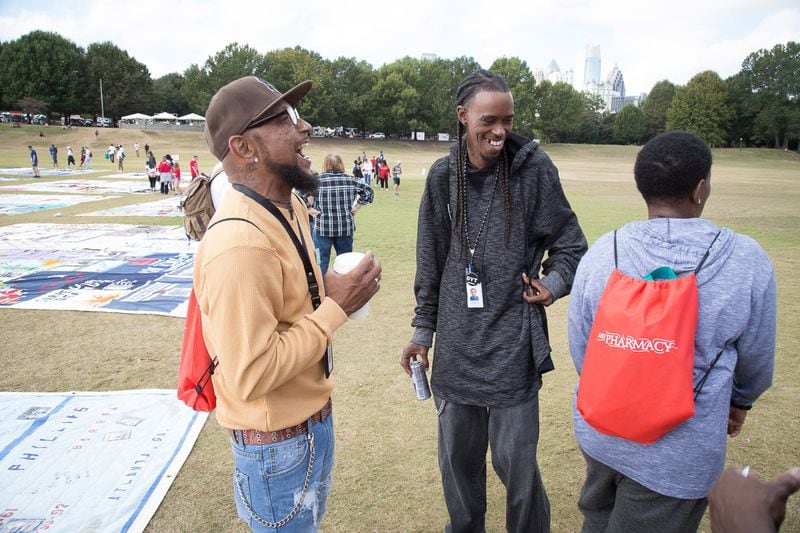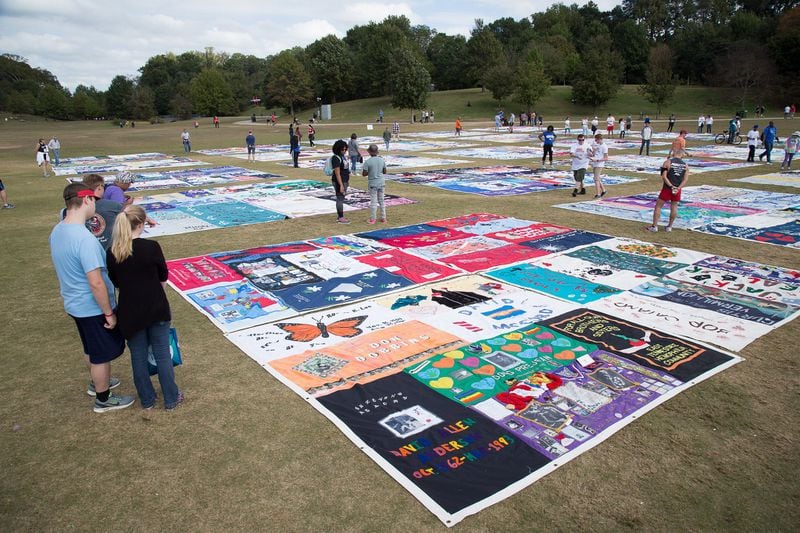The last few years of Damien Jamaal Davis’ life were filled with pain, confusion and finally comfort.
Diagnosed with HIV, which soon developed into AIDS, Davis spent his last years living with his grandmother and surrounded by his mother and sister. They fed and soothed him. They made him take his medicine, even when it seemingly made him worse. They were with him when he died in September 2014.
“That was the worst thing that ever happened to me. To us,” said his grandmother Peggy Baughns. “You can’t imagine. He dealt with depression. But we tried to encourage him. And it would have been devastating on him and us, had we not been around to care for him.”
That is why the concept of a quarantine brought up last week by Georgia Rep. Betty Price (R-Roswell), is to Baughns, and those gathered at Piedmont Park Sunday afternoon for the 27th Annual AIDS Walk Atlanta & 5K Run, so "disgusting," "cruel," and "appalling."
»RELATED ITEM: The silent epidemic: Black gay men and HIV
“What she said was powerful, insulting and damaging,” said Davis’ mother Desiree Ihetu, who along with her family proudly delivered a custom quilt to the NAMES Project AIDS Memorial Quilt in honor of her son. “In his final days, he got to live and be comforted by his family and nothing ever happened to anybody. I go to work and people sneeze on me and I get sick the next week. Are we suggesting that we quarantine them too?”
Price calls for quarantine, then backtracks
It might be safe to assume that before last week, most of the thousands of people who participated in Sunday’s AIDS Walk, never heard of Betty Price, who has only been in office since 2015. That changed this week when she asked a state official at a legislative committee meeting on healthcare access if there was a legal way to quarantine people with HIV.
“I don’t want to say the quarantine word, but I guess I just said it,” Price said. “Is there an ability, since I would guess that public dollars are expended heavily in prophylaxis and treatment of this condition? So we have a public interest in curtailing the spread. What would you advise or are there any methods legally that we could do that would curtail the spread?”
Price, who is a physician and the wife of Tom Price, who recently resigned as U.S. Secretary of Health and Human Services after racking up at least $1 million in travel on private and military jets, added, "It seems to me it's almost frightening, the number of people who are living that are potentially carriers. Well they are carriers, with the potential to spread, whereas in the past they died more readily and then at that point they are not posing a risk. So we've got a huge population posing a risk if they are not in treatment."
On Saturday, in a statement to the Atlanta Journal-Constitution, Price said her comments – which were recorded as part of the committee process -- were "taken completely out of context."
She said she is not in favor of a quarantine but made a “provocative and rhetorical comment as part of a free-flowing conversation,” statement because she was sad and troubled that “too many of our fellow citizens who have HIV are not compliant.”
Georgia Rep. Park Cannon (D-Atlanta), said that Price needs to offer a full apology.
“She directly offended the LGBT community and needs to apologize for it,” said Cannon, who represents parts of Midtown and spoke before the race.
“I spoke to her two days ago and I asked her to come to the AIDS Walk with me,” Cannon told the Atlanta Journal-Constitution. “She said that she would be out of town and that she doesn’t have time to talk about it.”
HIV/AIDS ravishing Atlanta
Price's comments come at a time when Atlanta is waging an epic battle against the AIDS epidemic.
Georgia ranks among the heaviest-hit states in the nation, second only to Louisiana in new HIV cases, with 28.3 per 100,000 population as of 2015.
Additionally, Fulton County has one of highest rates of new HIV infections in the country and downtown Atlanta has been compared by some medical and infection experts to a Third World country.
"Downtown Atlanta is as bad as Zimbabwe or Harare or Durban," said Dr. Carlos del Rio, co-director of Emory University's Center for AIDS Research in May of 2016.
According to the Centers for Disease Control, about half of all gay and bisexual black men in the U.S. will be diagnosed with HIV during their lifetime.
In 2013, the year before Damien Jamaal Davis died, black Georgians accounted for 66 percent of people living with HIV in the state, though they comprised only 31 percent of Georgia’s population.
Nicole Roebuck, the executive director for AID Atlanta, the state's largest HIV/AIDS service organization, said about 50,000 people in Georgia have been diagnosed with the virus. Of that about 20,000 people are not receiving any kind of medical care.
“And a big issue with that is the stigma,” Roebuck said. “Now, imagine these people hear (what Price said). “It is shocking and to make a statement like that makes me wonder how educated she is about the epidemic here. These are not the days when we didn’t know much about the disease. This is not the beginning of the epidemic.”
“Price has no compassion”
On the other side of Piedmont Park, those early days of the epidemic play out on the neatly formed AIDS Quilt, which cover a portion of the lawn. Throughout the afternoon, people quietly staggered through what was the equivalent of a cemetery. Most were silent as they carefully read the names on the quilts. Some cried.
Patrick Dent, who works for an organization that does free HIV and Hepatitis C testing, dragged his friends across the lawn to see one quilt. He didn’t know the people, but was struck by the pink quilt that included the name of a baby, who died of AIDS and his mother, who died five years later.
Dent has been living with HIV for 17 years. Willie Ervin, who was with him, has been positive since 1999. Develon Woods is 28 years HIV positive. You would never know with any of them.
“Price hasn’t been affected by this like we have and she has no compassion. In these days and times, with all the medical advances and with all that we know, it is crazy that she would say something like that,” Dent said. “We identify a lot of positive people and get them help and treatment. Something like a quarantine would deter them from coming and seeking help.”
Tears, hugs and Grace
Nearby, Natasha Boatwright couldn’t help but cry as she and her 16-year-old daughter, Arianna, looked at the quilts. About 15 years ago, her aunt Karen died of AIDS. Boatwright and her daughter were walking for Karen.
Edward Coss’ eyes were protected by heavy sunglasses on the overcast Sunday. He said he wasn’t crying as he and a friend looked at the quilts. The 56-year-old Atlantan said he has had “three or four” friends die of AIDS.
“Looking at these quilts, I am fortunate to not be one of them,” Coss said. “I have taken all of the precautions and get tested every year. But her comments show that in 2017, a lack of education and acceptance of common science and an understanding of medicine.”
Coss’ friend reminds him that Price is a doctor. A medical doctor, not a Ph.D., he says.
“That is extremely dangerous,” Coss said. “A doctor? Then I am dumbfounded that she would say this. It shows a deep prejudice underlying in that statement.”
Credric Terrell and his wife Grace, don’t have a clear picture of how many friends and family members died from AIDS. There was one friend who they said Grace would help wash and Credric would literally carry when he got too weak.
Credric would also lose a brother and a cousin to AIDS.
“We used to hug and hold them,” Credric Terrell said. “There was no fear. There is nothing to fear of people with HIV and AIDS. Not in 2017.”










